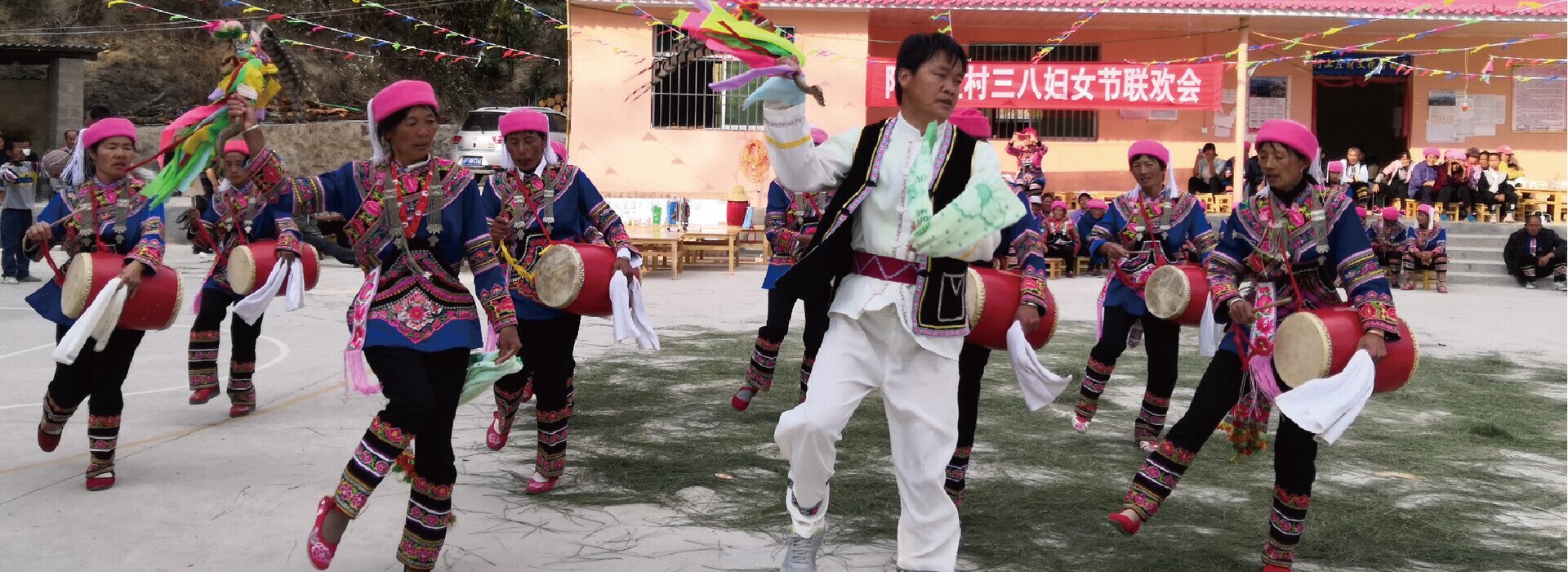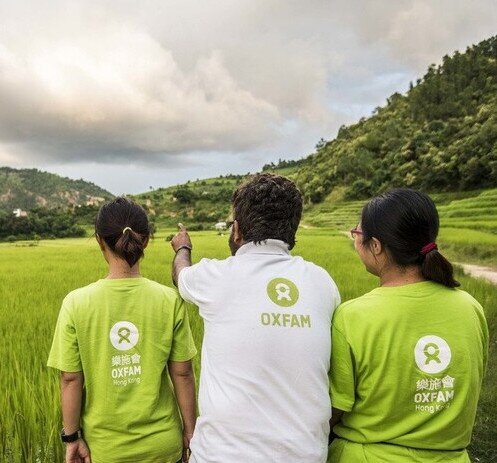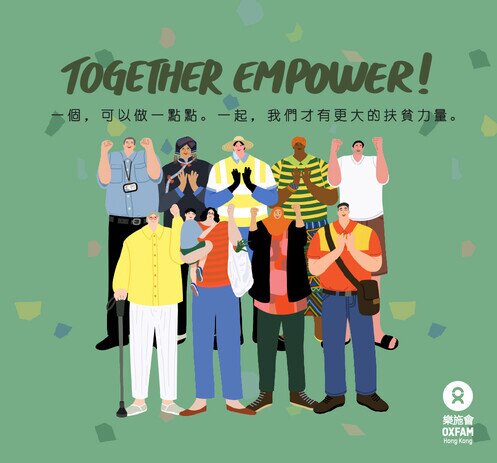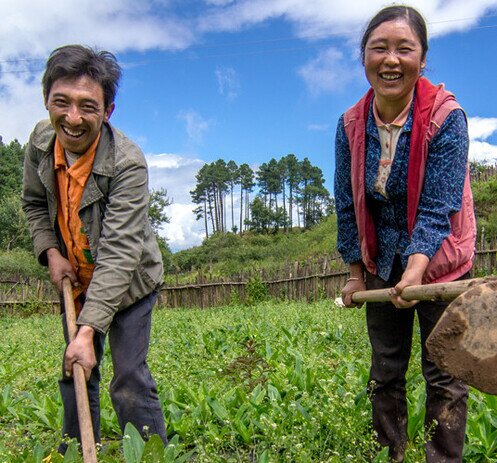Caption: People from the Yi Ethnic Community in Tayilong Village, Shuangbai County, Yunnan Province, celebrating Dragon Festival and Women’s Day.
About our work
China is the first country that met the UN target of halving the number of people living in extreme poverty, but the social factors that leave people at risk of falling into or back into poverty are showing a diverse and complex trend. As such, policy research serves a very important role in pooling resources together to implement an effective poverty reduction policy. Oxfam puts much emphasis on empirical research, action research and policy advocacy, and commits to promoting the alleviation and elimination of poverty problems at the institutional level. We are mainly concerned about the following three areas: empirical research on significant national poverty reduction policies, policy feedback based on action research, and food justice-related research and advocacy initiatives to improve vulnerable groups’ nutritional intake and so that they can benefit from food systems.
Together, we can transform more lives!
Publication
Rural Energy Poverty and its associated countermeasures in China (Chinese Only)
Stories
Sowing seeds for the future with seed banks

‘These seeds belong to all of us, and we should protect them.’
By finding and preserving quality seeds, our partner organisation worked with rural smallholder farmers to grow crop species that were more suited to the local climate, and differed from those produced by large-scale plantations to enhance competitiveness.
The poor population in mainland China has continued to decline over the last few decades. However, as of the end of 2019, there were still around 5.5 million people whose incomes fell below the poverty line threshold of RMB 2,300 per year. Huang Yinglan from Nanxui Town, Long’an County, Guangxi Zhuang Autonomous Region, is one of them.
Huang Yinglan, like other ‘left-behind women’ in the village – women whose husbands have left to work in the cities – used to grow corn for a living. She had poor harvests though because of the rough terrain and poor infrastructure there.
Seeing this, a local community organisation called Farmers’ Seed Network (FSN) developed poverty alleviation and conservation programmes with Oxfam in Huang Yinglan’s village in 2018. By finding and preserving quality seeds, the organisation worked with rural smallholder farmers to grow crop species that were more suited to the local climate, and differed from those produced by large-scale plantations to enhance competitiveness.
In 2019, Huang Yinglan and a group of women completed training on how to find and identify community seeds, and found that many local crop species were available in their own village. Learning this, they tried selectively breeding different types of beans and corn using eco-farming methods to boost the quality of the seeds.
There are currently over 30 local species preserved in the community seed bank, voluntarily built and run by these women. In addition, FSN has preserved around 800 traditional species in 40 communities from 11 provinces in mainland China, offering smallholder farmers with diversified and eco-friendly crop choices to improve their livelihoods.
Given the lack of information about rural seed banks in mainland China, FSN translated the classic ‘Community Seed Bank’ into Chinese, and invited experts in the country and overseas to compile selected successful cases into a publication, entitled ‘Participatory Seed Selection and Rural Development’. Publications like these enable our partners to not only share their knowledge and experience with communities and organisations abroad, but also learn from these groups. With Oxfam’s support, FSN also sent representatives to participate in a number of the United Nation’s Climate Change Summits, sharing their experience in seed conservation, as well as advocating the importance of biodiversity in community development and poverty alleviation programmes.
#RethinkPoverty audio story:
A Farmer and His Seed Bank
(Narrated by Manson Cheung)
'Many believe that poverty is synonymous with hunger and homelessness. But there are many different kinds of poverty. You could own land and work very hard to grow crops, but you could still be left with nothing because of climate change.'
Millet Candy: Winning On All Fronts
Eco-friendly Millet Candy from Shaanxi
The Oxfam Shop in Central saw the launch of a special product that’s come all the way from Shaanxi during Chinese New Year in 2018: millet candy. This candy is the fruit of the labour of farmers who are a part of the livelihoods project we and our partner Xi’an Farmers’ Market are implementing in the province.
In early 2018, I went to Shaanxi Province with actor, chef and hobby farmer Joey Leung (pictured to the right) to see how millet candy is made. On our way from Xi’an to the mountainous region of Fuping County, which is known for its millet candy, we got caught in the worst blizzard in eight years; all we could see around us was snow. Extreme weather is just one of the challenges small farmers in Shaanxi face – living in remote areas with little access to markets has also become an obstacle to residents here.
In Shaanxi Province, there are 50 counties that are recognised by the state as impoverished – including Fuping and Suide Counties – and they’re all located on the Loess Plateau. Suide County produces millet, but since farmers in the area have been using chemical fertilisers and pesticides for many years, the environment has continued to deteriorate; despite growing more crops through this method, this has created a race to bottom. As a result, farming has become an unviable livelihood option and many have moved to the cities to find jobs, so villages are now dying out.
Since 2016, smallholder farmers have received support to grow different crops like millet and soybean in rural Shaanxi through Xi’an Farmers’ Market’s project. In Majiachuan Village, Suide County, participants of the project are encouraged to cultivate crops in an eco-friendly way through the training they receive; we’ve also set up an online platform and linked farmers to farmers’ markets so they can sell their crops more effectively. Now, farmers don’t use chemical fertilisers, pesticides or herbicides anymore. This has not only put a stop to environmental degradation, but has also provided villagers and future generations with safer food.
Our partner organisation has also enlisted the help of Master Sun, who we met; he’s been making millet candy for over 30 years. After a 40-hour process, he was able to handmake millet candy using Majiachuan Village’s millet. Millet candy has not only boosted millet sales, but has also helped more people learn about the quality ingredients used to make the candy as well as this traditional craft.
The success of this project has encouraged villagers in Majiachuan Village to continue this way of farming and more farmers to join the project. They now also grow crops like mung beans, red beans and black beans; some have even begun raising chickens, and replacing the fertiliser they use with chicken manure, thus creating an ecofriendly way of growing crops and raising livestock. Steps like these aren’t only improving and protecting the environment, but also enhancing the quality of villagers’ food and even their livelihoods.
Text: Mabel Wong / Fundraising Manager - Appeals (Individuals Acquisition)




